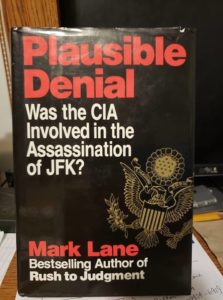
Some time ago (meaning at least a year) I picked up a copy of Mark Lane’s Plausible Denial: Was the CIA Involved in the Assassination of JFK? The price on the dust jacket is $22.95, but I know I didn’t pay that for it. It was published in 1991. I imagine I got it at a thrift store for a couple of bucks.
Was it a good purchase? Absolutely yes, so long as the price was under $5.00. I’ve read a lot of Kennedy assassination books. And I’ve known of Mark Lane for a long time. He was first into the market, in 1964, with a book-length critique of how the assassination investigation was being handled. Rush To Judgment is highly thought of by those who are convinced that the Warren Commission got it wrong.
The book is about a trial that was held in 1985, when E. Howard Hunt, former CIA agent of Watergate fame, sued the organization Liberty Lobby for an article that appeared in 1978 in their magazine Spotlight, the article saying that Hunt was in Dallas the day Kennedy was killed. The issue had been tried before, in 1981, with a verdict for Hunt and an award of $650,000.
But that verdict was set aside on a technicality. In the re-trial, Lane represented Liberty Lobby. The jury returned the opposite result this time: Liberty Lobby didn’t defame Hunt by publishing the article.
Lane’s approach was different than the first trial. First he had to set aside a ruling that the defense agreed Hunt wasn’t in Dallas that day. This he did successfully. Then he argued a strategy that Hunt almost certainly was in Dallas that day. Or, if he wasn’t, he couldn’t remember exactly where he was when he first learned about the assassination, and the memories of his three children, who at the time were old enough to carry those memories with them to adulthood, were aghast at what their dad might have done.
Lane’s conclusion: Hunt wasn’t with his children in the hours after the assassination. Where was he? Lane argues “in Dallas”. Doing what? Probably not pulling the trigger, but somehow superintending or aiding in the conspiracy to kill the president.
Lane, a practicing attorney at the time, goes somewhat deeply into the legal issues, the rules of evidence, the effect first trial decisions had on the second, nuances of depositions and cross-examinations. It was a little long for my liking, but not excessively long. I think Lane could have ditched about twenty pages of legal processes without hurting the book.
I found Plausible Denial informative. I learned a number of things I didn’t before. I’ve known for a long time that the CIA has been suspected of taking out the president, but didn’t really know why people thought that. Thanks to this book, I do now.
Lane’s argument to that: Hunt was CIA (before and after working at the White House for Chuck Colson); he was well-versed in covert operations; if Hunt was in Dallas that day but didn’t have a reason to be there such that he needs to hide the fact, then it must be a CIA operation. Lane makes the case much better in his 384 pages than I have in this paragraph.
On Amazon, I will give this book 4 stars. One star is removed for the excess legal discussion, and for the lack of sources. Some of Lane’s discussion comes off as speculative rather than factual. Still, it’s a good book.
Who should read it? If you’ve not read anything about the JFK assassination, this is NOT the book to start with. Any number of other books would be better. But this could be third or fourth on your list.
For me, this is a keeper, along with my other books on the subject (which includes Rush To Judgment, which I’ve yet to read). I will likely read it again during my retirement, when I will put my JFK library in a pile and read them back-to-back.